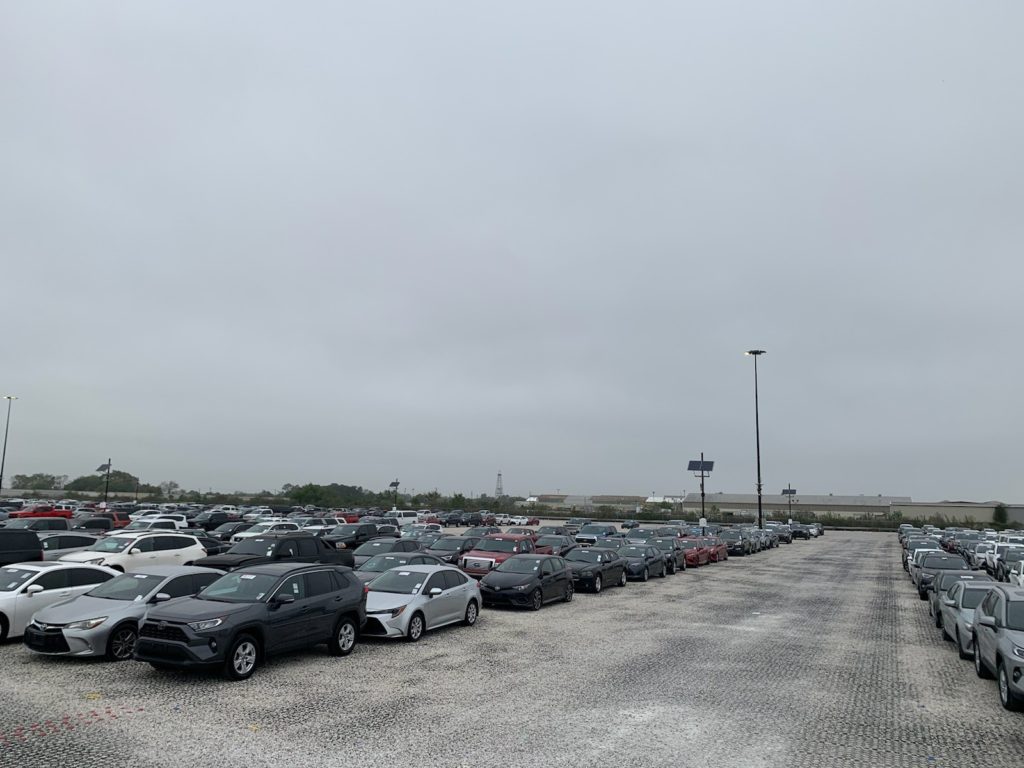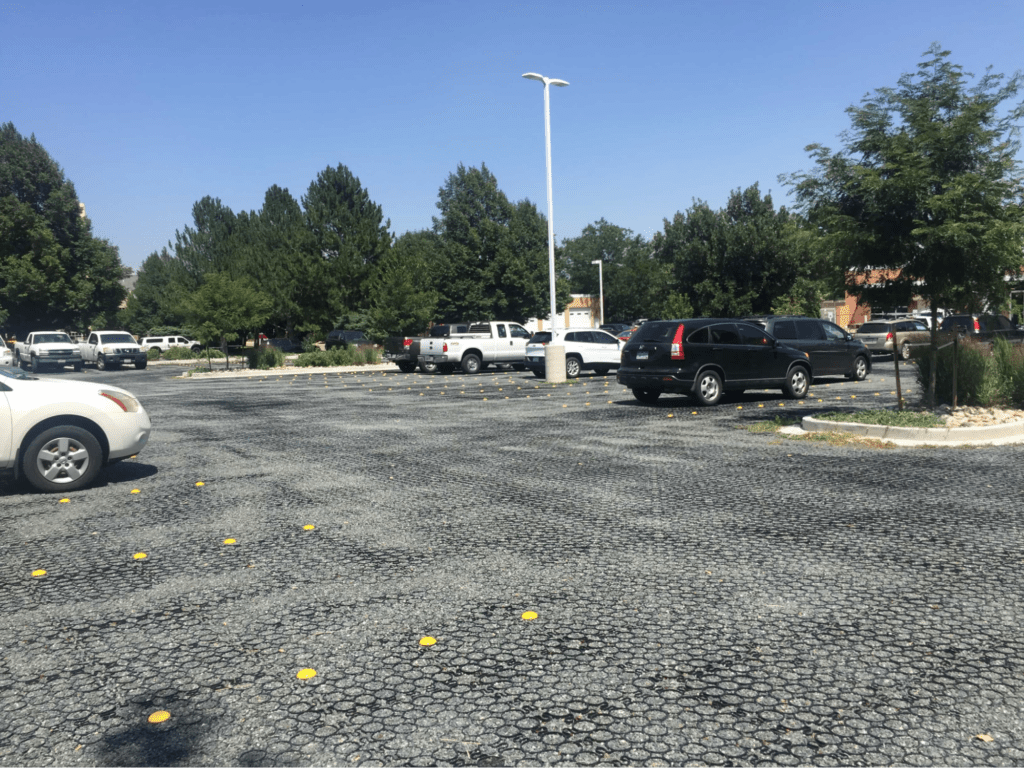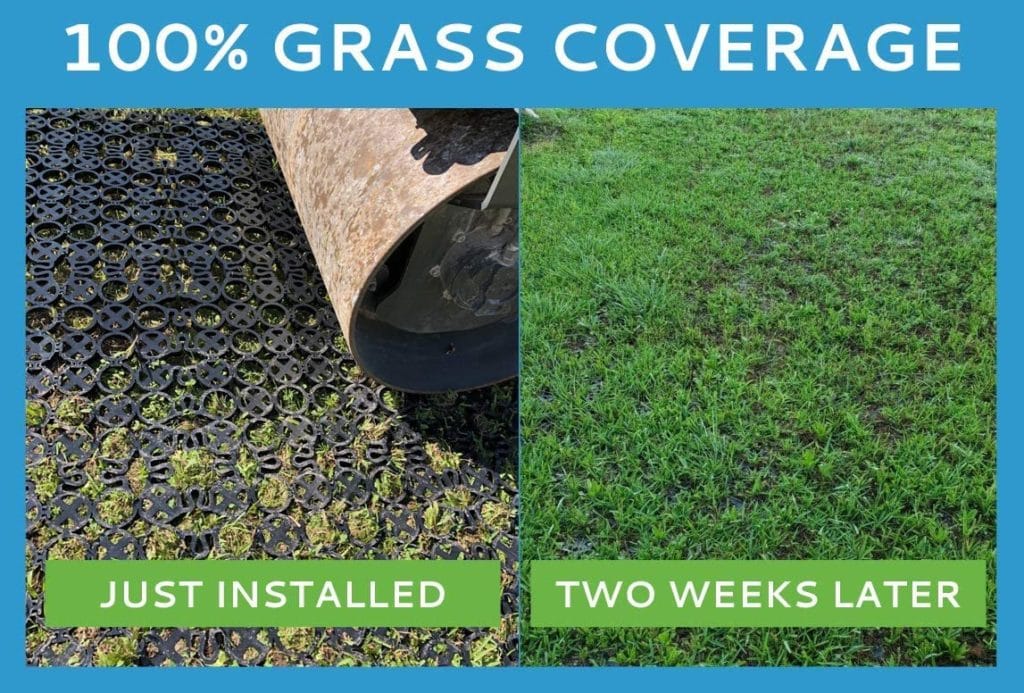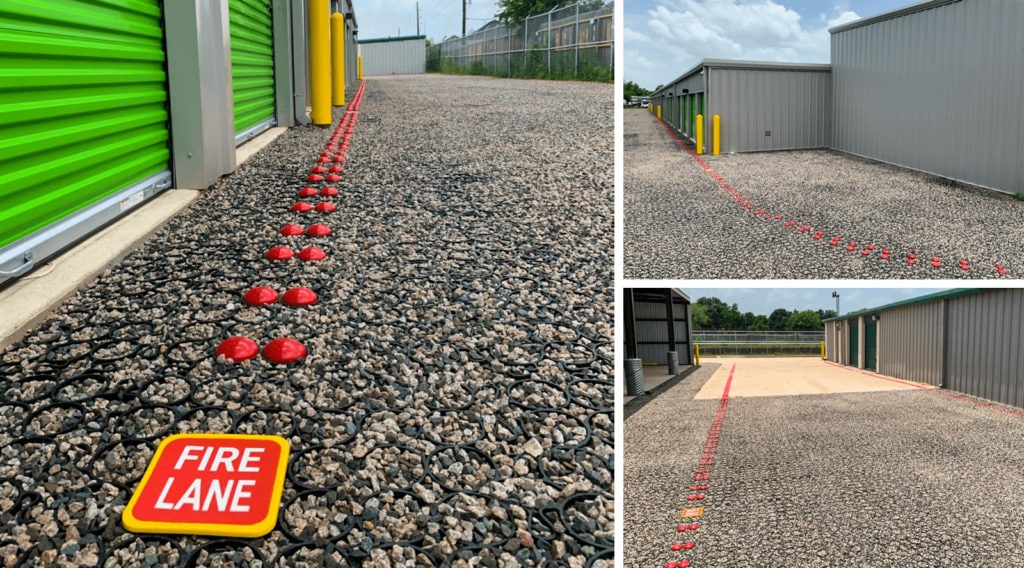The Best Pavement Solution for Salvage Yards

When it comes to heavy-duty traffic, salvage yards get quite a bit of use. From broken-down vehicles to big rigs, tractors, and other huge vehicles, salvage yards are home to some pretty big, heavy pieces of machinery.
Most salvage yards aren’t exactly paved from head to toe, so it wouldn’t hurt the average yard to upgrade its pavement. Pavement can play a huge role in the overall impact that a salvage yard has on the land and water around it.
It can also save you money over the long haul, depending on what type you implement. So, if you want to outfit your salvage yard with the best pavement possible, let’s take a look at the pros and cons of some of the most popular types of pavement.
What is a Salvage Yard?

A salvage yard, otherwise known as a junkyard, is a place for machinery to be taken apart. When a car breaks down and no longer runs, many choose to take it to a salvage yard. At the salvage yard, they’ll buy your vehicle wholesale and salvage what parts they can from it in order to turn a profit.
This means you’ll see a whole lot of vehicles, auto parts, and machinery at an auto yard. Heavy vehicles used for transporting broken-down vehicles from one spot to another are abundant. Tow trucks, for example, are a staple of any salvage yard.
Do Salvage Yards Need Pavement?
Most salvage yards don’t use very much pavement at all. The average salvage yard pavement will consist of a dirt lot, interspersed with grass here and there. This is, of course, a bottom-of-the-barrel approach to running a salvage yard.
Most salvage yard parking will be non-existent and tacky, likely taking the form of a rutted dirt road or driveway. Cars and machinery will be scattered all around the plot of land, leaving it looking like every stereotypical junkyard you’ve ever seen.
If you want to run a salvage yard that’s even halfway respectable, however, you need pavement. When it comes to junkyard paving there are 4 main types: loose gravel, asphalt, concrete, and permeable paving.
Loose gravel is better than parking everything on bare grass because it does at least provide a buffer between the sharp metal parts and your topsoil. It can provide some amount of traction to drive on as well. That is, before it inevitably spreads.
The biggest downside to using loose gravel in a junkyard is that it spreads quickly. This leads to you having to pour more gravel constantly to replace what has spread out. It can also grind down into dust and become muddy when it rains.
Asphalt is another popular choice for salvage yard pavement. It provides excellent traction for vehicles and can help prevent them from tearing upr soft grass or dirt. Asphalt isn’t durable over the long term, though, requiring resealing every 5 years and resurfacing every 10. This maintenance is not cheap. Asphalt also gets sticky in extremely hot weather.
Concrete works just as well as asphalt for salvage yard parking and costs about the same to maintain over its lifespan. It gets brittle in cold temperatures, though, and requires the same level of maintenance that asphalt does, which isn’t cheap. Concrete takes a long time to install as well.
Permeable Pavers Are the Best Choice for Any Salvage Yard

The best salvage yard pavement material is permeable plastic pavement, hands down. Unlike asphalt and concrete, permeable plastic pavers like the kind made by TRUEGRID require almost zero maintenance throughout their 60-year lifespan. This is a great way to cut costs while achieving all the benefits of asphalt or concrete.
TRUEGRID PRO PLUS, especially, is perfect for handling the rigors of junkyard duty. They are made from 100%-recycled plastic and are durable enough to handle the weight of the heaviest vehicles and machinery. They can also be installed in a fraction of the time it takes for concrete and asphalt.
The best part is, these pavers have a 100%-permeability which means they will let fluids drain directly into the soil and be filtered the way nature intended, as opposed to being directed into a local storm sewer to pollute the water supply.
Trust in TRUEGRID for the Best Permeable Paver Parking Solution for Salvage Yards
TRUEGRID PRO LITE and TRUEGRID PRO PLUS pavers are perfect for salvage yard pavement because they ecapsulate gravel in the empty cells on their surface to create a level, sturdy surface to drive and park on. With a 8-inch sub-base of gravel, a TRUEGRID permeable paved area can handle intense rain flow without flooding, which is perfect for many salvage yards that have low points, hills, and slopes that are prone to washing out. Often TRUEGRID can be installed on existing compacted aggregate with minimal prep eliminating the need for additional base aggregate.
All in all, it’s hard to debate the efficacy of TRUEGRID permeable pavers as the perfect paving material for salvage yard parking. If you want to reap the benefits of durability, fast installation, low maintenance, and 100%-permeability, don’t hesitate to call TRUEGRID today.

Large events come in all shapes and sizes, but while large events are fun to throw and attend, they come with many planning concerns. One of these concerns is parking. Large events require special parking that can handle the burden of many people all parking in the same spot.
In case you’re planning an event and you want to know how you can best arrange your parking, let’s take a look at some concerns and ideas that you might want to consider.
What is a Large Event?

Shows and gatherings happen all the time, but for something to be considered a large event it has to have more than 500 participants present at the same time. As such,
large events like these need ample parking for the people who show up. When you have large quantities of people going to any one place, parking is always going to be one of the foremost concerns on the minds of event planners.
Though some venues have built-in parking to handle the influx of people coming to their gatherings, many venues have to put up temporary parking. There are pros and cons to both permanent and temporary large event parking solutions, but for the sake of the event, temporary parking is preferred.
What Makes Temporary Parking Best for Events?

Having permanent parking in place usually refers to asphalt or concrete. These parking lots are impermeable and have lot lines that cannot be adjusted. They also aren’t often adjusted or updated with graphics that direct the flow of traffic. This means that you’ll have to rely on big electronic parking signs to point people in the right direction.
Making sure the flow of traffic is smooth and uninhibited is one of your biggest parking concerns. Having a messed up traffic flow can cause jams and lead to much frustration on the part of your event attendees.
Dealing with trash in your parking lots and spilled substances is another huge issue when it comes to parking. One of the best large event parking solutions to this problem is to implement permeable parking. This type of parking allows liquids to drain directly through the surface of the pavement and into the soil below.
This prevents trash from funneling down towards drainage grates or spot drains in your parking lot and clogging them. Clogged drainage is one of the biggest issues event planners face after throwing an event. It can be almost entirely prevented by implementing permeable pavement as opposed to using asphalt or concrete parking.
Another reason why temporary parking reigns supreme when it comes to large events is because it’s much easier to turn an existing field into a parking area. By using a product like TRUEGRID ROOT, you can stabilize an entire grass field and turn it into sturdy, reliable parking.
TRUEGRID Has the Best Solutions for Large Event Parking

When you look for permeable pavement that can withstand the rigors of large events, TRUEGRID rises to the top as the premier name in the permeable pavement industry. Whether you’re looking to perform a quick install of a stabilized gravel lot or you want to turn a grassy area into stabilized parking, TRUEGRID has you covered.

For large event parking solutions that require gravel parking, TRUEGRID PRO LITE and TRUEGRID PRO PLUS are the perfect large event parking solutions. TRUEGRID PRO LITE will get the job done in most situations but if you’re expecting more heavy-duty traffic, TRUEGRID PRO PLUS has you covered.
Made from 100%-recycled plastic, TRUEGRID pavers are impervious to many of the types of damage that break down your typical asphalt or concrete lot. They can last up to 60 years with minimal maintenance, which means you’ll save a ton of money on long-term event parking over the course of their lifespan.
A 100%-permeability rate means they will never flood and require no additional drainage as well. They also come with many different parking signs and markers that can be used to effortlessly direct the flow of traffic as you desire. They snap into place and can just as easily snap out of place if you need to adjust things.
The installation only requires a basic excavation and can be completed in a fraction of the time it would take to install concrete or asphalt. The same goes for TRUEGRID ROOT, which needS only be rolled out and pressed into the grass to complete installation.
Settle Parking Issues at Large Events for Good with TRUEGRID Pavers
If you want to lay out the best large event parking solutions money can buy for a large event, you’d be wise to roll with TRUEGRID. A lightning-fast installation, easy disassembly, incredible durability and versatility, all the accessories you need, and 100%-permeability means that TRUEGRID pavers are a match made in heaven for large events.
If you want to eliminate parking issues and make the whole coming and going process much easier for your attendees, contact TRUEGRID today to get in touch with a pavement professional.
When it comes to pavement there are really only two types, permeable and impermeable. Impermeable pavement is pavement that does not let any amount of water through its surface, by design.

Permeable pavement is the opposite. It’s specifically designed to facilitate the flow of water through its surface and into a sub-base of gravel before eventually draining back into the soil.
Within the category of permeable pavers, though, there are multiple variations of pavers. Permeable pavers come in all shapes and sizes and are made from all different types of materials. So, in case you were looking for a comprehensive guide to permeable pavers and paving systems, here it is.
Types of Permeable Pavers
Porous Pavement
Porous pavement is pavement that is only partially permeable, and comes in the forms of both concrete and asphalt. Both porous asphalt and concrete use a staggered surface that allows water to infiltrate and drain through the surface, albeit at a much slower rate.
This type of pavement is great for areas that don’t typically get much rain. There are many downsides to porous pavement such as cost of installation, maintenance requirements, longevity, and insufficient permeability for heavier rain storms.
Interlocking Brick and/or Concrete Pavers
These pavers use a series of interlocking pavers with gaps between them to allow for water drainage. They are much more permeable than porous pavement but are only suitable for light commercial and residential applications.
They do not stand up well under frequent or heavy traffic and must be constantly unclogged from debris to stay permeable. They are also expensive and labor-intensive to install and repair.
Rigid Plastic Pavers
Rigid plastic pavers feature hexagonal or round cells that trap gravel or grass and provide an avenue for water drainage. They are very permeable but not very suitable for heavy traffic or frequent use. Their rigidity can cause problems in a number of real-world applications…especially heavy turning, so they are often resigned to use on grass.
Rolled Plastic Pavers
These pavers are made to roll out during installation and can be difficult to line up and snap together…and they do require staking. Increased flexibility and easy storage are the main benefits of rolled plastic pavers. They are fragile and surprisingly expensive to install because they require staking to prevent shifting.
TRUEGRID ROOT pavers are the exception here, because they are not fragile and easily roll out for quick installation. No staking required.

Interlocking Plastic Grid Pavers

The best type of permeable pavers for commercial applications are interlocking plastic grid pavers.TRUEGRID PRO LITE and TRUEGRID PRO PLUS, are able to withstand immense amounts of weight and traffic. They can even handle the weight of any vehicles on the road including full loaded semi truck traffic.
These are one of the only types of permeable pavers that require almost zero maintenance, and never shift or pull apart after installation. They encapsulate gravel in the robust cells at the surface, and provide a level and 100%-permeable surface to drive and park on.

One of the reasons why interlocking plastic grid pavers like the kind TRUEGRID makes are so beneficial for commercial business owners is that they provide built-in drainage for your pavement. This means you won’t have to worry about installing extra drainage systems that cost a ton and use up precious square footage on your land.

TRUEGRID pavers are ADA-compliant and made from 100%-recycled plastic, making them one of the most eco-friendly and accessible pavement materials in the world. They’re also compatible with a wide variety of accessories that can be used to mark handicap spots, add parking lines, reflective markers, and more.
TRUEGRID Permeable Pavers are the Best Permeable Paving Option

When it comes to permeable pavers for commercial or residential purposes, nothing beats TRUEGRID. Unless you’re simply a big fan of the look of concrete or asphalt, there’s no reason to implement a more fragile and expensive type of pavement.
Not only is installation of these pavers simple, it can be completed in a fraction of the time that concrete, asphalt, or brick can. You need simply have the desired paved area excavated to a depth of about 8 inches and a piece of geotextile fabric laid at the bottom to create separation between the soils and base stone for optimal drainage and detention. Then, the base rock is laid and compacted until level.
Next, the pavers are snapped together in place over the top of the filled pit as easily as you would with LEGO blocks. Afterward, more gravel is poured over the top and spread into the empty cells of the pavers with a heavy roller or vehicle. This completes the installation and weighs the pavers to the ground, and prevents them from shifting out of place.
When you stack up every permeable paving material against one another, it’s clear that TRUEGRID stands head and shoulders above the rest. If you want to reap the benefits of a beautiful aesthetic, up to a 60-year lifespan, low maintenance requirements, eco-friendliness, and 100% permeability, contact a pavement professional at TRUEGRID today for a free quote.
Self storage businesses are a great way to make a decent profit and can be a very hands-off endeavor once you get up and rolling. Starting one of these businesses is as easy as procuring the land and correct permits, laying the pavement, and installing the self storage units before setting up fencing and security measures.

In this way, it can be kind of hard to differentiate yourself from other businesses in the area. You might be lucky enough to thrive even without a specific edge over the competition, but you’re always better off with an edge on your competitors than without.
One of the ways you can gain an edge is by installing the right kind of pavement. There are many options for your paving materials, so let’s take a look at what the best solution is for paving your self storage business.
Types of Pavement
1. Asphalt
There are a handful of paving options you could consider popular for a self storage business. The first is asphalt. Asphalt is the most popular paving option for most people because it’s such a long-standing tradition. Asphalt is rather inexpensive and many people have a predisposition to asphalt because it’s so commonplace.

The pros of asphalt are that it is relatively inexpensive, as stated above, and it gets the job done. Self storage units don’t get a ton of traffic, so asphalt will last a bit longer than it does in a grocery store parking lot, for instance. However, you’re still expected to reseal your asphalt lot once every 5 years and resurface it every 10 years.
Resealing and resurfacing can be costly and time-consuming. You’ll also have to work with your renters to see if they can avoid coming through while the lots are being done. Asphalt can get sticky in the summer on hot days and it absorbs heat. This creates a heat island effect that could make your self storage business unbearably hot on certain days, which is something to consider.
2. Concrete
Concrete is another widely popular material used for paving self storage businesses. Concrete is rather durable, and costs around the same as asphalt to install and maintain over time. Concrete differs from asphalt in that its texture is smoother and the color is usually grey or off-white.

Some business owners may prefer this look, but concrete has durability concerns of its own. For instance, although asphalt suffers in the heat, concrete suffers in the cold. Cold temps can make concrete brittle and susceptible to cracking. Concrete also needs to be resealed every 5 years and resurfaced every ten years, just like asphalt.
Overall, the main reason you might want to use concrete is the aesthetic. You can alter the look of your concrete with graphics, stenciling, and colors to create a unique aesthetic that other businesses don’t have.
3. Loose Gravel
Loose gravel is the cheapest option on this list and makes a great choice if you need a temporary solution. However, the amount of traffic that a self storage business tends to get means your loose gravel will be spreading around all over the place. Gravel needs to be raked and/or replaced once it’s spread, and is a constant maintenance effort.

Loose gravel also grinds down into dust rather quickly, creating another problem for your renters. This dust can turn to mud when it rains and create quite a mess, so using loose gravel isn’t exactly the first choice for many self-storage business owners.
4. Permeable Pavers

The best way to stand apart from the crowd while offering a high-quality, professional-looking paved area to your renters is to use permeable pavers for your self-storage business. Permeable pavers stabilize gravel within them, to prevent it from spreading or grinding down into dust.
TRUEGRID PRO LITE and TRUEGRID PRO PLUS permeable plastic pavers, for example, will last up to 60 years with minimal maintenance required. These pavers are made from 100%-recycled plastic, making them the most eco-friendly option on the market.

With 100%-permeability, TRUEGRID permeable pavers are also a built-in drainage system for your self storage business. Instead of sloping your pavement and/or adding additional drainage grates and piping, TRUEGRID pavers allow you to enjoy a two-in-one pavement/drainage solution. Installation is incredibly quick and can often be completed in a day or two. The TRUEGRID system uses a sub-base of gravel beneath a layer of pavers on the surface.
The surface of the pavers is also filled with gravel and compacted, to create a neat, level surface with plenty of traction. TRUEGRID permeable pavers won’t shift or come apart unless you want to take them apart, in which case disassembly is also very quick and easy.
Help your Self-Storage Company Stand Out with TRUEGRID
It never hurts to have an edge in any industry. In self-storage, there aren’t many places you can’t find one, so utilizing TRUEGRID as a unique, cost-effective way to build pavement is a smart choice.
TRUEGRID pavers look great, last up to 60 years, require little to no maintenance, and save you money on additional storage. If you want a state-of-the-art permeable paving system for your self storage business, get in touch with a pavement professional at TRUEGRID today.

